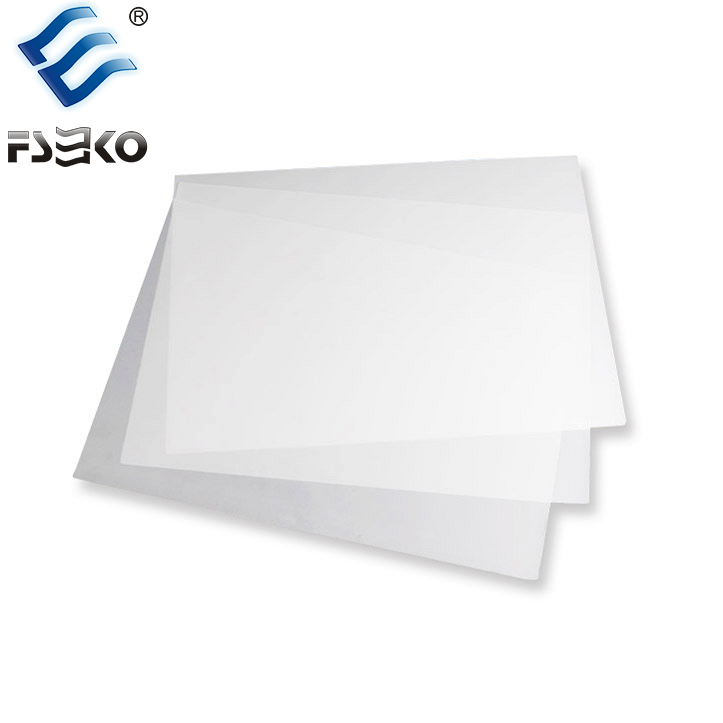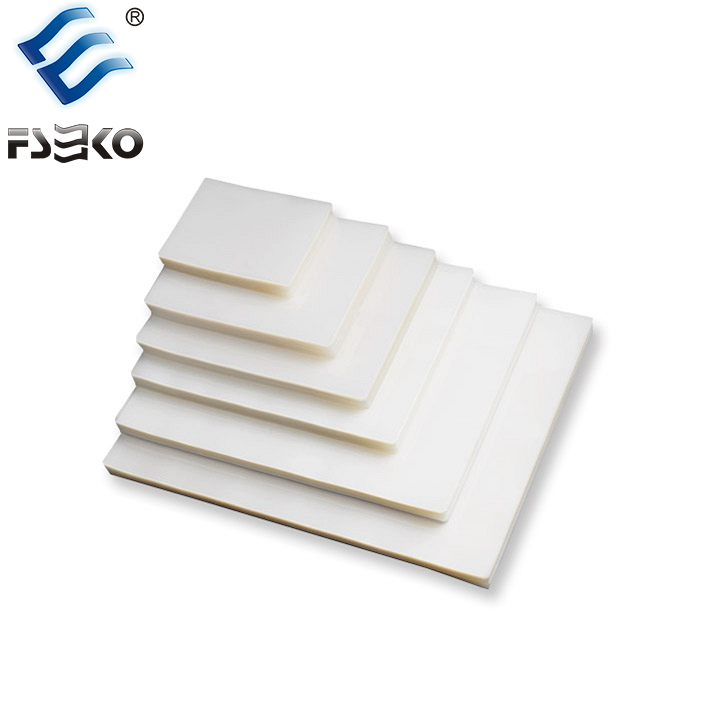PET Thermal Lamination Pouch Film For Document Laminating
Product Description
The PET thermal lamination pouch film is the sheet film, customers can purchase according to their common used size, such as A4, B5 etc. After laminating, this film don't need to be cut. It's suitable for document, menu, certificate, name card, photo, ID card, etc.
EKO has a broad product portfolio by catering to a wide range of industry needs, including BOPP thermal lamination film, PET thermal lamination film, super sticky thermal lamination film, anti-scratch thermal lamination film, digital hot sleeking film, etc. We also provide customized solutions to meet specific customer requirements, both logo and size, strengthen relationships with customers and improve customer satisfaction.

Specification
| Regular used for | Size |
| A3 | 307*430mm/303*426mm |
| B4 | 267*374mm/263*370mm |
| A4 | 220*307mm/216*303mm |
| B5 | 192*267mm/188*263mm |
| A5 | 158*220mm/154*216mm |
| B6 | 138*192mm/134*188mm |
| Post card | 109*154mm/111*154mm |
| Photo | 95*262mm |
| Price card | 68*99mm/70*100mm |
| Pass card | 65*95mm |
| name card | 60*95mm |
| regular card | 60*90mm |
| ID card | 57*82mm/55*85mm |
After sales service
Please let us know if there's any problem after receiving, we will pass them to our professional technical support and will try to help you to solve.
If the problems are still unresolved, you can send us some samples(the film, your products which have problems with using the film). Our professional technical inspector will check and find the problems.
Storage indication
Please keep the films indoor with cool and dry environment. Avoid high temp, moist, fire and direct sunlight.
It's best used within 1 year.

Thermal lamination film product Q&A
1. What is thermal lamination film?
Thermal lamination film is widely utilized in the printing and packaging field for protecting and improving the appearance of printed items. It is a multi - layer film, typically consisting of a base film and an adhesive layer (EKO uses EVA). During the lamination process, the adhesive layer is activated by heat, resulting in a firm bond between the film and the printed material.
2. How to use thermal lamination film?
Using thermal lamination film is a relatively simple process. Here are the general steps:
a) Prepare the printing material: Make sure the printing material is clean and free of any dust or debris.
b) Setting up your laminator: Follow the instructions that came with your laminator for proper setup. Adjust the temperature and speed settings according to the type of thermal lamination film you are using.
c) Loading Film: Place one or more rolls of hot laminating film on the laminator, making sure they are properly aligned.
d) Feed the printed material: Insert the printed material into the laminator, making sure it is aligned with the film.
e) Start the lamination process: Start the machine to start the lamination process. Heat and pressure from the machine will activate the adhesive layer, bonding the film to the printed material. Make sure the laminate comes out the other end of the machine smoothly.
f) Trim excess film: After lamination is complete, use a cutting tool or trimmer to trim excess film from the edges of the laminate, if necessary.
3. How many types of thermal lamination film does EKO have?
BOPP thermal lamination film
PET thermal lamination film
Digital super sticky thermal lamination film series
Thermal lamination film for inkjet printing series
Low temperature thermal lamination film
Soft touch thermal lamination film
Anti-scratch thermal lamination film
BOPP thermal lamination film for food preservation card
PET metalized thermal lamination film
Embossing thermal lamination film
etc.
For other products using in printing industry, there are digital hot sleeking foil, DTF film & DTF paper, thermal transfer ribbons, etc.
FAQ
The PET thermal lamination pouch film is the sheet film, customers can purchase according to their common used size, such as A4, B5 etc. After laminating, this film do not need to cut.
The normal PET thermal lamination film is roll film, it need to be cut after laminating.



